The Hazards of Red Lines
Has Bashar al-Assad crossed the red line drawn by President Obama? And does it matter?
It looks very much as though Bashar al-Assad’s regime has used chemical weapons against the rebels in Syria. The Washington Post’s editors note that puts the Obama Administration into a pickle:
THREE MAJOR U.S. allies — Britain, France and Israel — have now concluded that the Syrian regime of Bashar al-Assad has very likely used chemical weapons. This would cross a “red line” drawn by President Obama not once but on multiple occasions. An Israeli general said Tuesday that “the regime used lethal chemical weapons against gunmen in a series of incidents in recent months,” including a March 19 attack near Aleppo where a “sarin-type” substance was employed. The British and French governments reported to U.N. Secretary General Ban Ki-moon that they had corroborating evidence, including soil samples, of chemical-weapon use in three instances since December.
Though his policy on Syria has been weak and muddled, Mr. Obama has been very clear that the United States “will not tolerate the use of chemical weapons against the Syrian people,” as he put it last month. He has said that such use would be a “game-changer.”
The failure of the international community to respond to the limited use of chemical weapons could tempt the regime into their more extensive use. The failure of the United States to respond to the use of chemical weapons despite repeated admonitions against their use could bring the seriousness of U. S. threats into question, not just with respect to Syria but with respect to Iran and North Korea as well.
On the other hand nothing has really changed in Syria. The hazards of a U. S. military intevention in Syria are no less than they were a year ago. The likelihood of the success of a “no-fly” zone, arming the rebels, or even putting boots on the ground is no greater than it was.
I think the lesson here is clear: don’t draw red lines. Don’t make threats. They may constrain you in ways that are more damaging to your interests than just remaining silent.
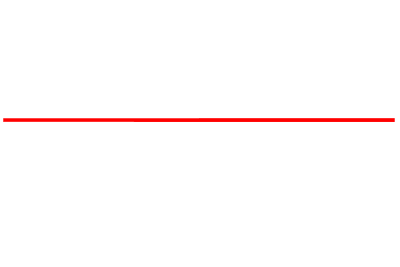


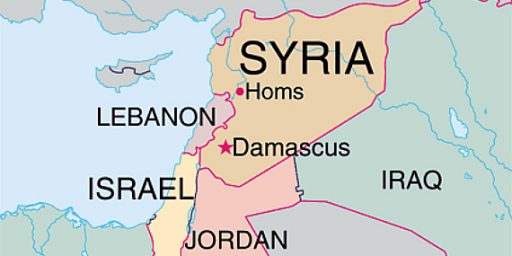
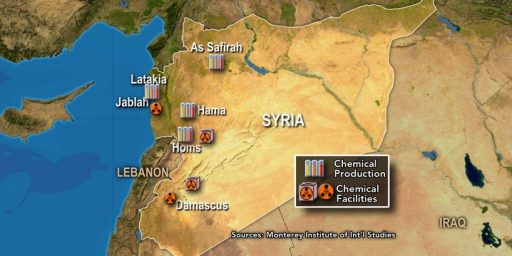
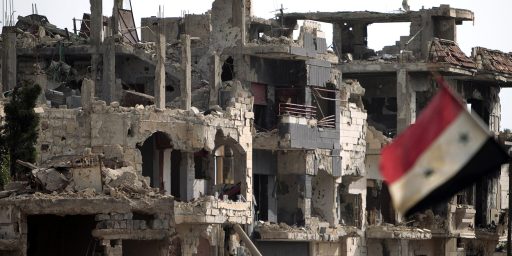
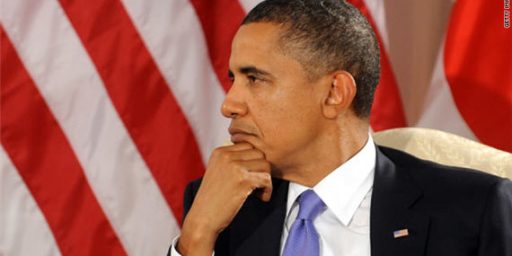
I’m guessing this is why the U.S. has been denying the reports?
I suppose there are ways for the U.S. ramp up its opposition to the regime without full intervention. And to be honest, I interpreted the red line as directed towards the risk of another Hama massacre.
True that, Dave. About the worst possible thing you can do in foreign policy is makes threats – especially _specific_ threats – you don’t actually intend to carry out. Degrees of freedom == 0.
This is, I’m afraid, the price we pay for having an amateur foreign policy. That’s not so much a dig at Barack Obama, who was indeed woefully inexperienced when he took office, but at our entire system. Presidents rarely have significant foreign affairs credentials. And we compound that by having the top positions in foreign affairs filled by appointed amateurs.
I have to agree. The administration’s red line has backed them into a corner and they are in a lose lose situation.
The whole Syria issue is a mess anyway and I am not sure anyone can do much to make it better, but the last thing I want to see is a military commitment from the US.
The solution is to “work through the UN” with “our allies and partners”. The UN can pass a few resolutions, and they an establish a no fly zone. The “allies and partners” can monitor the zone for activity and throw a few planes at it every now and then.
Iran is going to do what they want to do. North Korea is going to do what they want to do. Nobody is going to do anything to stop either. To Europe and the US, Syria is worthless. They are above Darfur but not by a lot. Once the killing stops, there will be the cries of “never again”, and the next time will be the same.
Using the UN as a cover for delaying/avoiding responding works for me.
But yes, I’d have preferred no “red line” had been drawn (or at least, publicly drawn). If we get sucked into Syria (moreso than we already are via “nonlethal aid” that is), I will move from being largely ok with Obama’s FP record (despite my annoyance at him for Libya) to anger. Maybe that’s not much (I’m sure O is just shaking in his boots), but it’s what I’ve got.
@Rob in CT: But where is your “red line” with Obama? Will you be angry if he launches some missiles at Syrian military targets? If he starts arming insurgents? Supports a Libya style not-war, no-boots on the ground campaign?
Without a red line you aren’t sending a clear message to the POTUS.
I’m betting that the real red line for Obama would be an unquestionable mass attack on civilians. Small, scattered attacks with ambiguous evidence ain’t gonna cut it.
As to what the Administration will do, I expect they’ll do a Libya style campaign.That worked OK.
Because Fred Hiatt’s merry band of neocon’s say it did? Until our intelligence services agree with Hiatt’s assessment I don’t see why anyone would expect a reaction from our country. Hopefully the WaPo editorial board will be just as ineffective in their warmongering here as when they were agitating to defeat a Hagel nomination before it was even announced.
Also, I’m confused by the above. What is it the President said that constrains him? This isn’t like when Netanyahu demands a “red line” where crossing it triggers military action against Iran, as Obama never threatened that with respect to Syria. While he said that the use of chemical weapons would be a game changer he didn’t constrain himself by defining the consequences. More sanctions? More aid to the rebels? How exactly is he constrained?
http://www.reuters.com/article/2013/04/24/us-syria-crisis-usa-sarin-idUSBRE93N01W20130424
@PD Shaw:
Clever, PD. Worth a chuckle, even. Give yourself a pat on the back.
A pro would probably prefer to keep his powder dry in case everything short of overt military intervention fails. This seems to be what’s happening.
It’s a line in the sand, I thought. Assad uses nerve or blister and we will do something about it. Don’t think that’s a bluff. Could be anything from remove his stocks to decapitate the regime though…
The rebs have been trying to fake it for quite some time hoping we would take Assad out for them. Israel wants us to go in there and take the CW out. The Brits and the French would like us to clean the whole mess up…